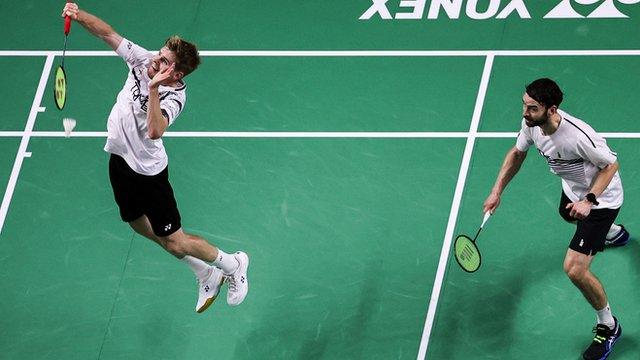Cultural changes needed at Badminton England - report
- Published

Marcus Ellis, left, and Chris Langridge were not selected for men's doubles at Tokyo 2020
Badminton England must introduce "some fundamental cultural, behavioural, and procedural changes" in order to deliver its Olympic and Paralympic programmes, a report has found.
Badminton England (BE), GB Badminton and UK Sport commissioned the report.
It came after doubles partnership Chris Langridge and Marcus Ellis spoke out about their treatment during the Tokyo 2020 Olympic selection process.
The report has outlined six recommendations for change.
These included a need to improve safeguarding protocols, foster better relationships between individuals within the programme, develop clearer communication between all parties and integrate a world-class multi-disciplinary team to help with sport science, medicine and wider support.
In response to these recommendations - listed in full below - BE says it has 'fully investigated' the issues raised and has developed a 50-point plan, which includes the development of coaches, a female leadership programme, an equality, diversity and inclusion strategy and mental health and safeguarding.
The report will not be published in full to protect the anonymity of the contributors. However, Pete Fitzboydon, interim chief executive of BE, admitted it made "tough reading".
"It has equipped us with the insight we needed to create a world-class badminton programme with the return of UK Sport funding," he added.
"A lot has been said in public and it has been quite personal. There's an awful lot of hurt, both in the coaches and the players.
"[Mediation] is going well and we are confident everyone can be welcomed back into a happy training environment."
Speaking to the BBC in July 2021, Langridge and Ellis said they felt they were "treated like dirt" and "stabbed in the back" when Ben Lane and Sean Vendy were chosen ahead of them for the men's doubles.
The pair won an initial appeal but an independent panel decided the governing body had followed selection policy rules and the line-up was ratified by the British Olympic Association.
Of the report and findings, the players said: "The last six months have been the toughest of our careers, both physically and emotionally.
"We are pleased the report highlighted how the culture needs to change and that the Olympic selection issue was just the straw that broke the camel's back.
"This is the first step in a long process to a better environment where players and staff can thrive. We're looking forward to seeing the plan delivered and getting back to focusing on representing England on the world stage."
Lauren Smith, who plays mixed doubles with Ellis at the Tokyo Olympics, told BBC Sport the report was important because the player-coach relationships had got to a point that affected respect with athletes feeling below coaches. "That made players feel voiceless and that's not going to get the best out of athletes," she said.
Ellis says he feels "ashamed" he did not speak out sooner as it was only until he was affected that he commented on issues but is "positive" about the changes being made.
Team GB did not win a medal in Tokyo in badminton, however Paralympics GB claimed a silver and a bronze.
UK Sport has invested significant funds, a combined amount of more than £4m for their Olympic and Paralympic programmes, for the Paris 2024 Games.
Report findings, recommendations and Badminton England's plan
The report outlined eight key findings, including:
There is clear evidence that issues and player concerns over the programme were widely felt and long-standing. The fallout around Olympic Team selection was a triggering event which highlighted existing day-to-day challenges. There was evidence of inappropriate behaviour by all parties and while there was no desire to progress them formally, there is a clear need to complete the mediation process to repair relationships.
There are concerns regarding the mental health and well-being of players and coaches, specifically how those issues are monitored and acted upon. Numerous examples of mental health needs were raised to the panel, with support staff stretched and several "near misses".
The coaching team is mainly male, long-serving, and from a similar elite playing background. This has contributed to a feeling of unequal treatment of females in the programme. The working and personal relationships within the coaching team has normalised certain behaviours that were reported as discomforting for players, especially females and junior athletes.
Previous funding constraints led to the absence of multi-disciplinary team (MDT) practice in support of athletes. The gap in provision compared to other sports is now even wider due to funding constraints.
There is an absence of a clear process to support athlete induction, development, and transition and little evidence of a systematic, collaborative, and transparent performance planning process
Recommendations
The report recommended six changes for Badminton England to act upon:
Ensure safeguarding protocols are developed, clearly communicated, and appropriately implemented.
Improve the current relationships between individuals on the programme.
Undertake a review of the leadership and governance structure of the World Class Programme.
Integrate coherent world class Multi-Disciplinary Team (MDT) support, including industry standards for sports science, medicine and wider support.
Integrate World Class Performance processes, with particular emphasis on clear communication and transparency from all parties.
Provide targeted support from GB Badminton to the Paralympic programme leadership and general outreach support for non‐centralised coaches and players.